Ayurvedic treatment for Infertility: Natural therapies for Infertility
Ayurveda is a time tested repository of natural medical sagacity.
Ayurveda also offers treatment options for infertility as well.
Ayurvedic methods of treating MALE & FEMALE
Infertility goes far beyond than conceiving.
We lay stress on delivering a brilliant &
A wise offspring who can
Contribute to society.
Infertility treatment with Ayurvedic wisdom!
According to Ayurveda, the Shukra Dhatu (reproductive tissue) is responsible for fertility & it can be enhanced with diet, behaviors changes, & lifestyle modifications. Ayurvedic regimen not only helps in producing healthy sperm and ovum but also enhances the Ojas (Life sap) which create vigor, stamina, & immunity.
Click to Read More....
Ayurveda considers Ojas to be an essence of all Dhatus which directly influences fertility. In women, the Shukra Dhatu produces the ovum, and in men, it produces the semen. Ayurveda naturally enhances the quality of Shukra (male sperm count), Artavam (Beeja) or ovum of the female and strengthens Kshetra (uterus) of the female with the Rasayana Aushadhis.
A) Shukra:- Shukra Dhatu is the seventh Dhatu, responsible for conception. The Ayurvedic herbs can enhance the quality of Shukra Dhatu to make it suitable for conception.
B) Artavam:- Artavam is main Dhatu responsible for conception. The Ayurvedic herbs can enhance the quality of Beeja (ovum) of the female, making it naturally healthy for conception.
C) Kshetra:- Kshetra is the uterus where the conception takes place. Ayurvedic treatment makes the uterus more effectively prepared for conception and helps retaining the fetus.
Read Less....
The Ayurvedic treatment for azoospermia: Natural therapies for azoospermia
Azoospermia is a medical condition during which the semen of a male contains no sperm. Ayurveda believes the body to be made up of seven Dhatus - Rasa, Rakta, Mamsa, Meda, Asthi, Majja, and Shukra. The deficiency of Shukra Dhatu leads to Azoospermia.
Click to Read More....
This medical condition occurs due to Anuloma Kshayam (improper nutrition/ abnormal metabolism) or Pratiloma Kshayam (excessive masturbation/intercourse). Various Ayurvedic herbs are helpful in improving the Shukra Dhatu naturally.

Read Less....
The Ayurvedic treatment for oligospermia: Natural therapies for oligospermia
We can compare oligospermia to Shukra Kshaya. This condition haunts men and is characterized by a low sperm count. The modern lifestyle and stress of daily lives, faulty diet, and lifestyle can lead to a low sperm count. Apparently, imbalanced Pitta and Vata Dosha lead to the loss of Shukra Dhatu.
Click to Read More....
The Ayurvedic scholars have advocated the quality of semen in the following Shloka: -
"Shukramshuklam gurusnigdhammadhurambahalambahu
Ghritamaakshikatailabhamsadgarbhay"
From the above Shloka, it may be understood that the healthy fertile semen is white, heavy, sticky, sweet, quantifiable, and looks like Ghee. The creation of Shukra starts with the digestion of food, then goes on to transformation of food to nutrient fluid, blood, muscle, fat, bone, bone marrow, and finally, to Shukra Dhatu . Quality and effectiveness of Ayurvedic treatment targets sperm abnormalities viz. abnormal sperm cell morphology, low motility, low semen quantity, and low sperm count etc.

Read Less....
Ayurvedic treatment for polycystic ovary syndrome (PCOS)
Ayurveda can potentially treat polycystic ovary syndrome (Artava Kshaya). Polycystic ovary syndrome is an endocrine system disorder in women. It involves a group of symptoms viz. the occurrence of multiple cysts in the ovaries, high levels of male hormones, and irregular/skipped periods.
Click to Read More....
The most apparent symptoms of PCOS are irregular periods, acne, & undesirable hair growth etc. Ayurvedic treatment can naturally balance Tridoshas along with strengthening of Artava (ovum). PCOS direct the way of involvement of Kapha and Vata Dushti causing Avarodha or Avarana in Artavavaha Srotas. The treatment principle is to clear obstruction, normalize metabolism, and regulate the menstrual system (Artava Dhatu). Ayurvedic methods are the safest way to eliminate the symptoms of PCOS.
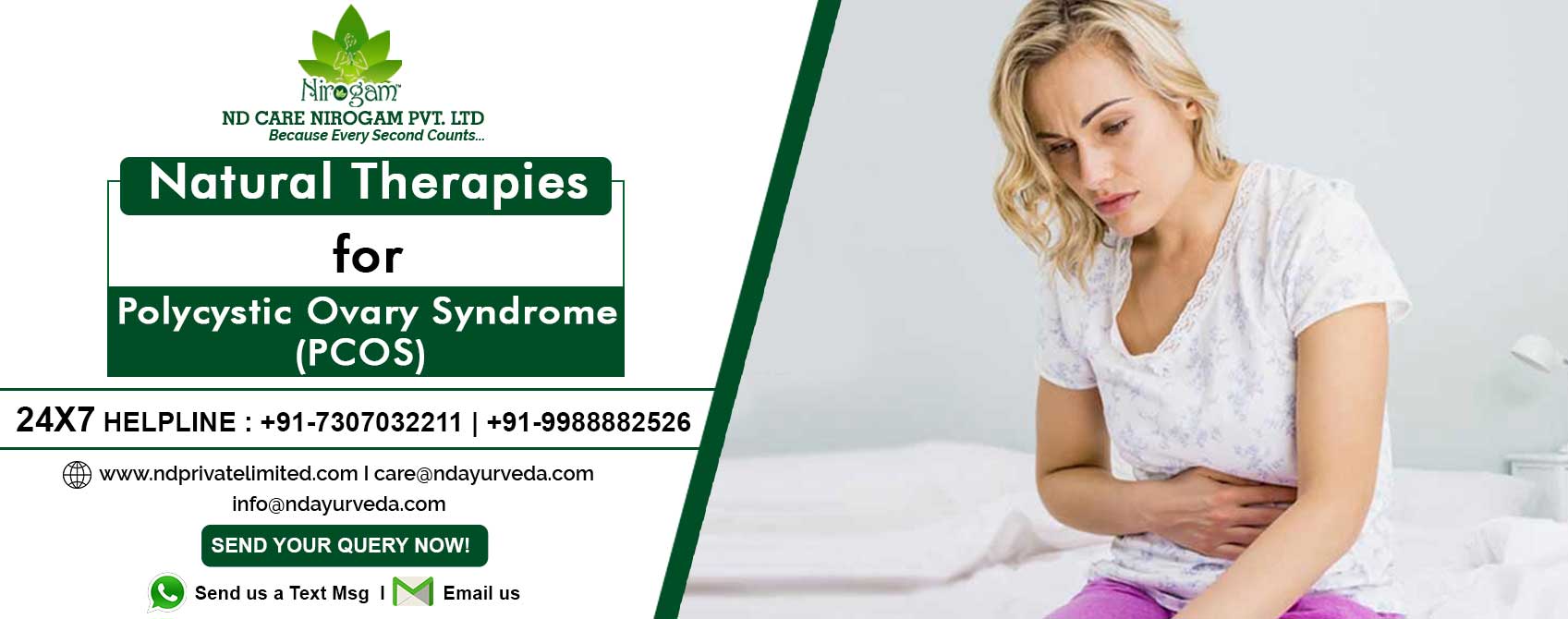
Read Less....
Ayurvedic treatment for endometriosis: Natural therapies for endometriosis
Endometriosis is a painful gynaecological disorder. It is caused due to abnormal growth of tissue (endometrial cells) in a location outside of the uterus. From an Ayurvedic point of view, endometriosis occurs due to a deranged Vata Dosha. Apana Vata is in charge of elimination-including menstruation.
Click to Read More....
In the case of endometriosis Apana Vata starts moving upwards instead of downwards. Endometriosis Ayurveda treatment involves balancing of the deranged Apana Vata, strengthening the Agni, & the removal of Ama (toxins).

Read Less....
Ayurvedic treatment for uterine fibroids: Natural therapies for uterine fibroids
In Ayurveda, uterine fibroids are categorized under 'Yoni Vyapad',. Uterine fibroids are the lump like benign tumors of the female uterus (womb). Uterine fibroids are non-cancerous and resemble mushrooms sprouting, coming out of the soil. Uterine fibroids are simply the overgrowth of Mamsa Dhatu, with vitiation of Rakhta, and Medo Dhatu, of the uterus.
Click to Read More....
This condition mostly prevails due to deranged Kapha Dosha. The recommended Ayurvedic, treatments are combined with specific change in diet, adjusting lifestyle, and regular Yoga to synchronise biological rhythms, balance the nervous system, improve natural resistance/immunity, poor digestion, and Ama (toxin) elimination to ensure non-recurrence of fibroids. Ayurvedic treatment contains Raktashodhaka (blood purifier), Aamapachana, Vatanulomana & Lekhana (scrapping or dissolving) herbs. Ayurvedic line of treatment can potentially slow the growth of fibroids & dissolve existing fibroids while preventing the development of new ones.
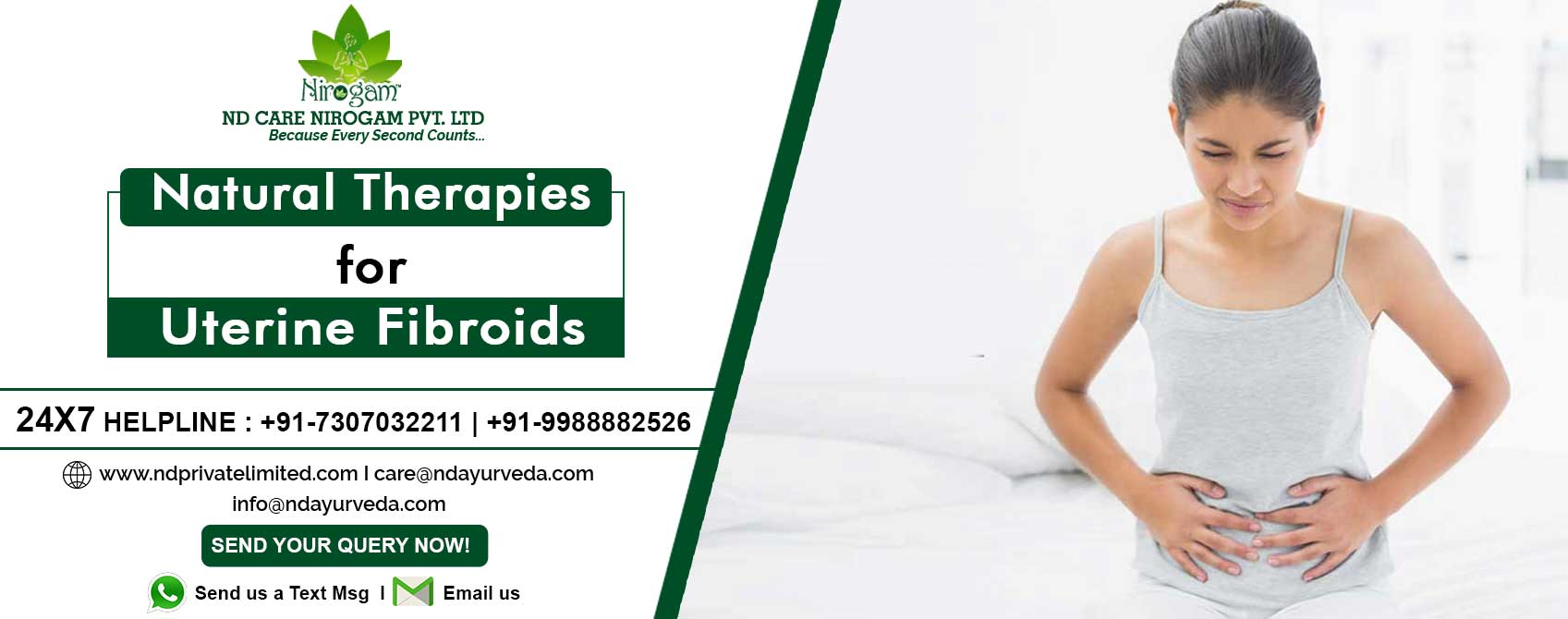
Read Less....
Ayurvedic treatment for blocked fallopian tubes: Natural therapies for blocked fallopian tubes
A female has blocked fallopian tubes (Artavavaha Srotas) if an obstruction prevents the ovum/egg from travelling down to the uterus. Blocked fallopian tubes are medically known as "tubal occlusions". Correlating fallopian tubes with the Artava-bija-vaha-Srotas, its blockage is compared with the Sanga-Srotodushti of this Srotas.
Click to Read More....
The Ayurvedic approach is focused on clearing the fallopian passage to facilitate the downward movement of the Artava (ovum). Ayurveda recommends Vatakapha shamak and tridoshaghna herbs which have Ushna, Tikshna, Sara, Laghu, Pramathi and Sukshma properties, so that it could remove the blockage by reaching up to the minute channels. Ayurvedic herbs also enhance circulatory/lymphatic system and reduce abdominal congestion to promote the blood-flow towards the reproductive organs. Ayurveda recommends best herbs to reduce fluid retention to treat a tubal blockage.

Read Less....
Ayurvedic treatment for ovulation disorders: Natural therapies for ovulation disorders
An ovulation disorder is a condition of irregular/absent menses. The Ayurvedic treatment includes purification and functional optimization of the reproductive tissues (Artava) of females. As Ayurvedic treatment progresses, the Ojas (life force) and Rasa Dhatu (plasma tissue) start bringing the nourishment for ovaries, fallopian tubes, cervix, and vaginal canal.
Click to Read More....
Tissue metabolism and nutrition are specifically maintained during this time period to achieve a conception. We provide the combination of herbs which enhances the process of ovulation. Ayurvedic herbs have stimulatory effects on the ovarian tissue that enhances the required repair of the endometrium. Ayurvedic products nourish the ovum and increase fertility naturally.
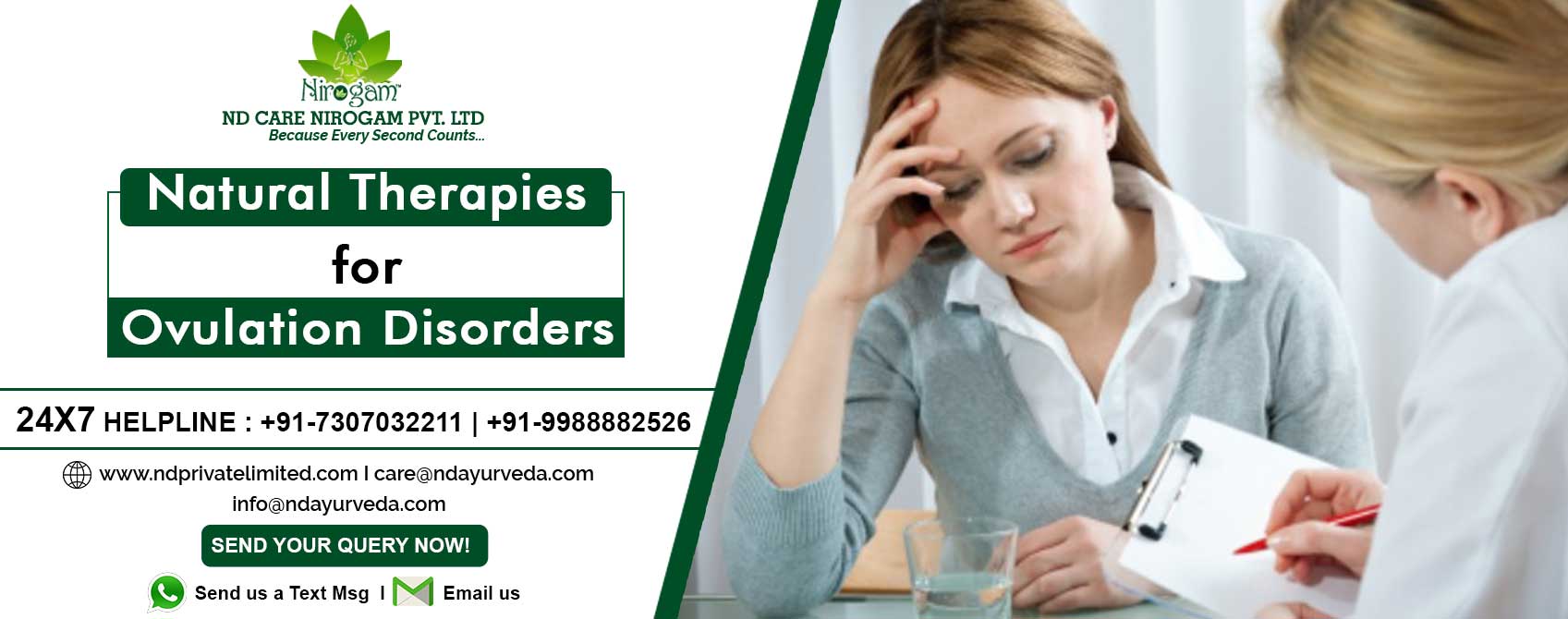
Read Less....
The Ayurvedic treatment for erectile dysfunction (ED): Natural therapies for erectile dysfunction (ED)
Erectile dysfunction (Dhwajabhangam) is caused by vitiation of Vata (Major), Pitta, Kapha, and Rakta. In Ayurveda, both psychological factors (Manasika Klaibya) and physiological factors (Doshaja Klaibya) are considered to treat erectile dysfunction.
Click to Read More....
Vajikarana, a branch of Ayurveda that deals with aphrodisiacs, contains many effective therapies, and herbs to treat erectile dysfunction.

Read Less....
Ayurvedic treatment for lost libido: Natural therapies for lost libido
In Ayurveda, the management of sex-related diseases are inculcated under a distinct branch named as Vajikarana. A decreased interest in sexual activities and inadequate sex drive is often reasoned with the lost libido. The naturally reduced levels of hormones or chronic stress may take your libido away.
Click to Read More....
Ayurveda considers the loss of libido as a part of Klaibya (sexual dysfunction) and vitiated Vata Dosha as one of its root causes. Numerous Ayurvedic herbs have been used for centuries to treat this condition separately for men and women. These natural aphrodisiac herbs can replenish both Shukra and Artava (Reproductive tissue of male and female respectively) and provide you the heightened desires to have copulation. Ayurveda uses inherent power of anciently described herbs that can significantly enhance your poor blood circulation and metabolism.
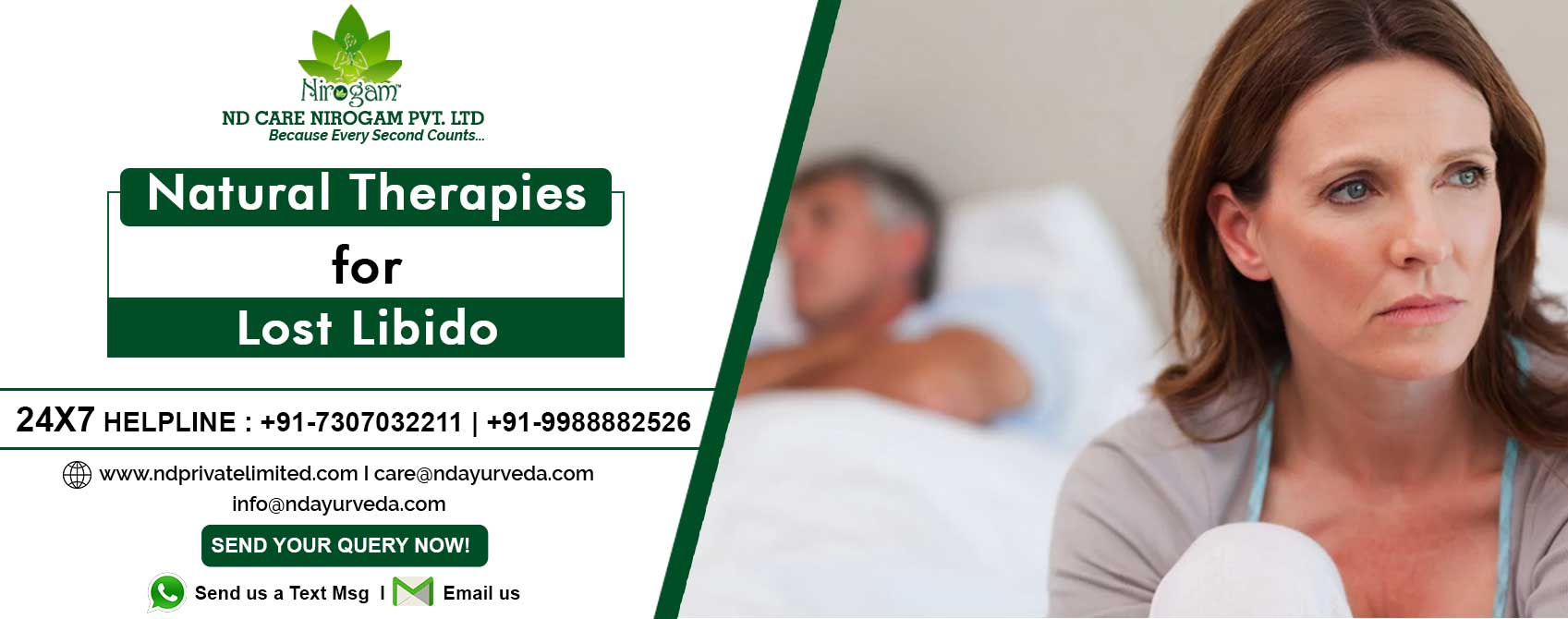
Read Less....
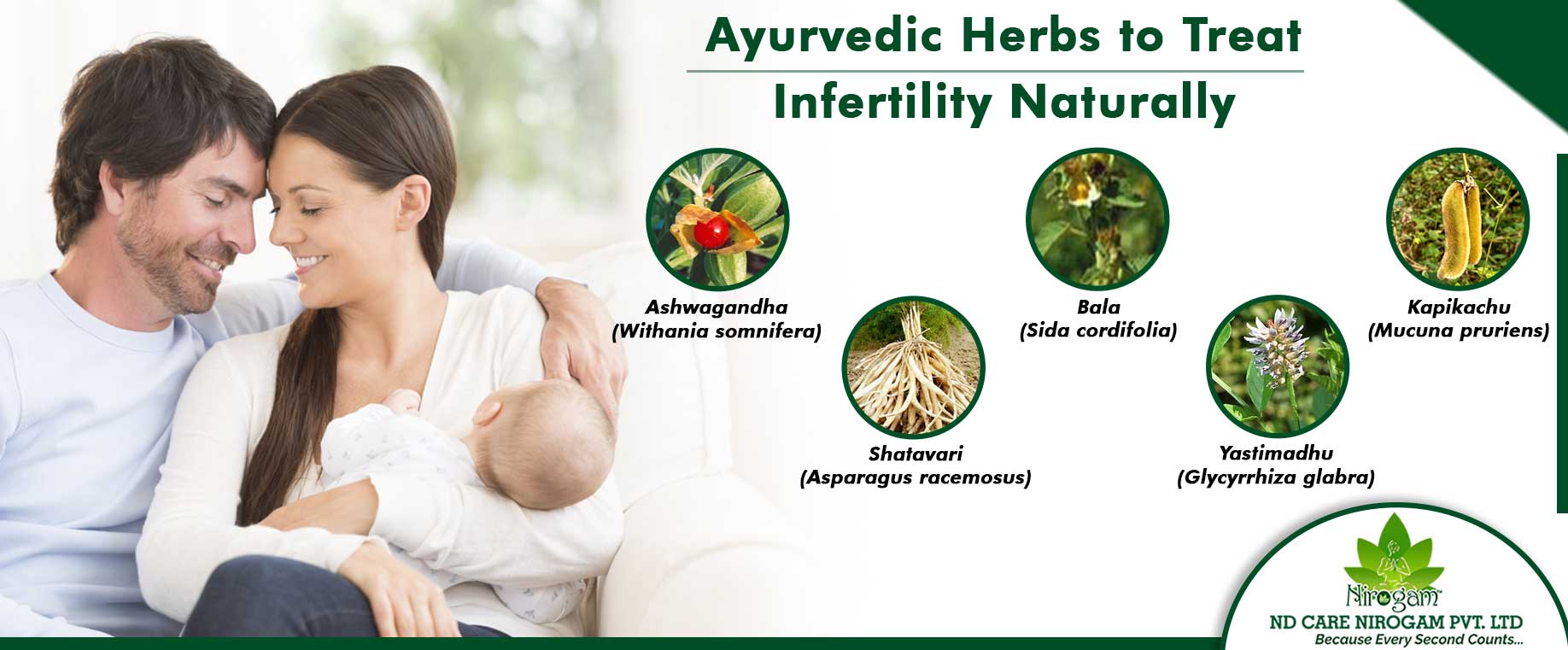
Nirogamz Nusper Granules "Supports reproductive health"
-
Herbal reproductive tonic.
- Promotes healthy libido.
- Supports healthy reproductive system.
Nirogamz ED "Boost your libido naturally"
-
Balances the hormonal level.
- Provides nutrients to the muscles and nerves for proper functioning.
- Promotes vitality, strengths and maintains a healthy libido.

Diet to tackle infertility
- Eat fresh green leafy vegetables (cucumber, beetroots, carrots, broccoli, beans, cabbage, bottle gourd (Ghiya), round gourd (Tinda) , bitter gourd (Karela) , spinach, fenugreek (Methi), pumpkin, & sweet potatoes.
- Eat fresh fruits (Banana, Pineapple, Amla, Jamun, Apple, Mosambi, Plum, Pomegranate, Papaya, Berries).
- Pulses, legumes, sprouts, & cereals (brown rice, millets, ragi, wheat vermicelli, oats, dalia, quinoa suji).
- Keep your body hydrate (with drink of 3-4 liter water a day) & use double-toned milk (lassi, curd, milk based products etc.).
- Eat dry fruits like almond, walnut, dates, and coconut & add seeds in your diet like; pumpkin seeds, flax seeds, sesame seeds, melon seeds, chia seeds.
- Oils to be used in cooking are olive oil, mustard oil, flax seed oil, & sesame oil.
- Avoid fried foods, refined flour/sugar, saturated fats, red meat, chicken with skin, liver, prawns, fatty fish, egg yolk, salty foods papads, preservatives chutney sauce, pickles, baking powder, baking soda, preservatives soup/foods, caffeinated beverages like tea, coffee, carbonated beverages.
Pranayama for infertility
Bhramari Pranayama: - One of the main reasons for infertility is psychological stress. This Pranayama helps in stress-relief and also reduces anxiety levels bringing sense of calmness to mind.
Click to Read More....
Kapalbhati pranayama: - It helps with hormonal imbalances which can be the cause for infertility. It detoxifies the body as circulation is enhanced. It increases the quality and the quantity of reproductive cells.
Yoga for infertility
Sarvang Asana: - Increases blood-flow to pelvis and uterus thereby cleansing the body and enhancing the function of reproductive organs.
Setubandh Asana: - When the pelvic area is raised above, blood and energy-flows to uterus and ovaries increases & makes them healthier and improves their function.
Exercises to enhance fertility
Soft Tissue Mobilization: - It increases blood-flow and mobility. It also helps in treating malposition uterus, endometriosis, restricted ovaries, or scar tissues which can be the cause for infertility. It helps in the balancing of hormones.
Walking and jogging: - It increases blood-flow to the body which is very essential for reproductive health. It is important for cardio-vascular fitness.
Read Less....